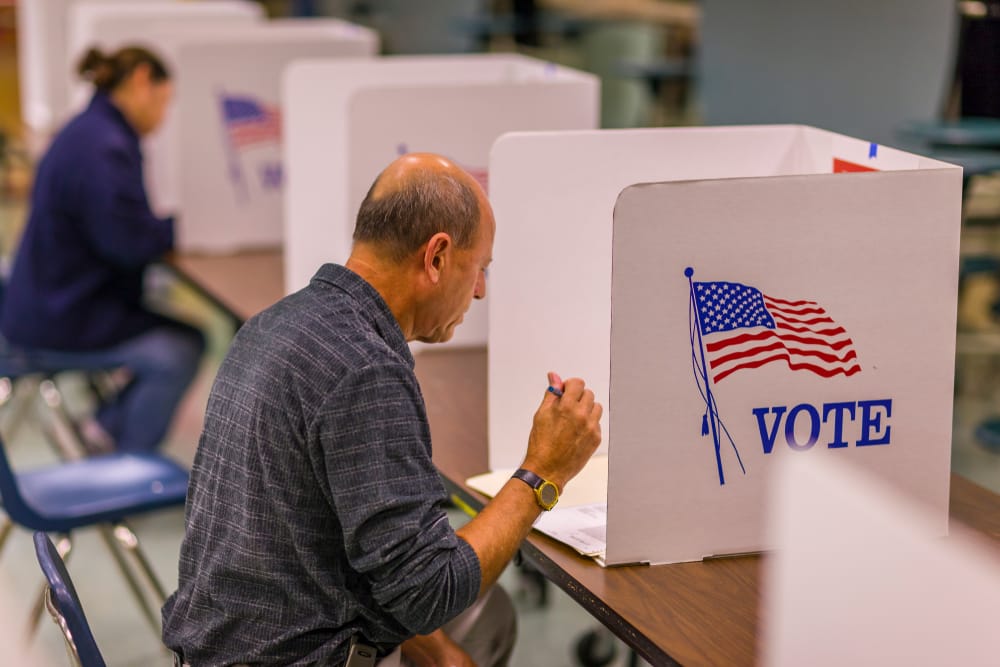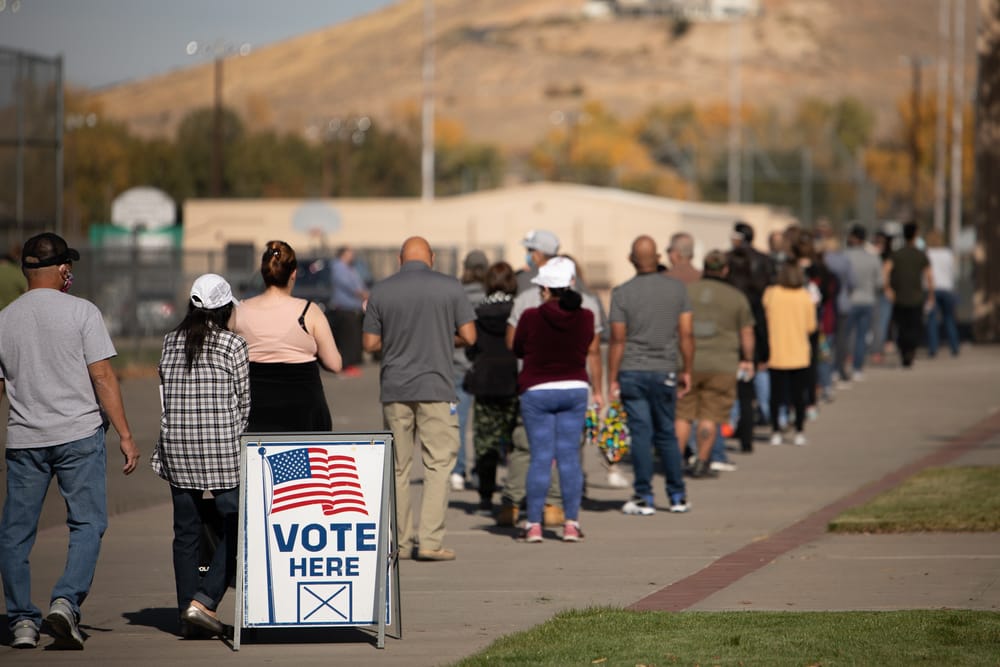Criminal Justice Reform Extends Rights to Felons Who Have Served Their Sentences

For decades, voter enfranchisement or disenfranchisement for incarcerated and formerly incarcerated individuals has been debated. An estimated 4.6 million Americans are barred from voting due to a felony conviction, but several states have made recent changes to enfranchise people who have committed crimes.1
How the Landscape Breaks Down
In the U.S., it has been common practice to make felons ineligible to vote. However, over the past few decades, a criminal justice reform trend has developed that seeks to return the right to vote to nonviolent felons at some point, though results have varied from state to state.2
This process of reform has produced results that can be sorted into four categories:
- In Washington D.C., Maine, and Vermont, felons never lose the right to vote, even while incarcerated.
- In 23 states, felons lose their voting rights only while incarcerated, but their rights are automatically restored as soon as they are released.
- In 14 states, felons lose their voting rights while incarcerated and for a period after they are released, typically while on parole or probation. Their voting rights are typically restored after this period, though they may have to pay outstanding fines, fees, or restitution before their voting rights are restored.
- In 11 states, felons indefinitely lose their voting rights for some crimes. Such individuals may petition the governor of their state or attempt other tasks and petitions to regain their voting rights.
Recent Shifts in the Voting Rights Landscape
At least since the 1990s, dozens of states have passed laws that recognize a simple principle: Once a convicted felon has served their time in prison, that individual has paid their dues to society and deserves the rights and freedoms afforded other American citizens, voting rights included.
For example, just between 1996 and 2008:

- Seven states repealed lifetime disenfranchisement laws for several types of offenders.
- Two states afforded probationers the right to vote.
- Nine states passed laws requiring former offenders to be given information and assistance to regain their voting rights.
- Twelve states adopted legislation improving the process of regaining voting rights.
- In 2009, Washington fully restored the right to vote for felons who complete their sentences.
- In 2013, Delaware eliminated the five-year waiting period before voting rights can be restored for former prisoners.
- In 2015, Kentucky adopted an executive order that automatically restored certain offenders’ right to vote (and to hold public office).
- Also in 2015, Wyoming adopted new legislation that required the Department of Corrections to issue a certification of the restoration of voting rights to certain nonviolent felons after they completed their sentences.
- In 2016, Maryland and Virginia restored voting rights to felons who had completed their prison sentence, while California restored voting rights for people serving time in county jails (but not state or federal prisons).
- In 2017, Wyoming granted voting rights to nonviolent felons.
- In 2018, Florida passed a citizen-led ballot initiative and a constitutional amendment to “automatically restore the voting rights of felons after completion of their sentences (including parole and probation).”

Photo by Trevor Bexon/Shutterstock.com
- In 2019, Oklahoma, Colorado, Nevada, and Kentucky enacted new legislation or executive orders that provided new access to the ballot for people who had committed crimes and served prison sentences.
- In 2020, New Jersey, Iowa, and California all passed laws providing access to the ballot for people who had committed crimes but who had served out their prison sentences.
- In 2021, Connecticut, New York, and Washington passed laws restoring voting rights to citizens on parole.
- In 2023, New Mexico and Minnesota passed laws restoring voting rights to citizens on parole.
While there have also been examples in the last three decades of states regressing (by removing voting rights for formerly incarcerated individuals, even individuals who only committed nonviolent crimes), the overall trend is that most states are putting forth new laws that make it easier for people to vote at some point, even if they have committed a crime.
In Which States Are People Still Barred from Voting, Even After Completing Their Sentence?
Some states still make it difficult for people who have committed crimes to vote, including those who have served their prison term and paid their debt to society. These states are:3
- Florida. In Florida, those convicted of felony murder or a sexual offense cannot vote, even after completing their prison sentence. Other felons must complete their sentence, probation, parole, any other terms ordered by the courts, and all supervision, and fully pay all restitution, fines, fees, or costs before voting.
- In Alabama, there are 46 listed crimes that, if committed by an individual, that person cannot vote, even after they complete their sentence. However, most offenders can apply for a Certificate of Eligibility to Register to Vote (CERV) through an expedited process, but some will require a full pardon from the governor.
- In Mississippi, felons convicted of murder, rape, bribery, theft, arson, obtaining money or goods under false pretense, perjury, forgery, embezzlement, and bigamy cannot vote, even after completing their full prison, parole, and probation sentences. However, this clause of the state’s constitution is currently being contested.
- In Tennessee, those convicted of murder, rape, treason, or voter fraud are permanently disenfranchised from the ballot box, absent a pardon.
- In Virginia in 2023, the current governor reversed a 2020 Executive Order that “automatically restored voting rights for many people upon release from prison and provided an application process for restoration as long as not incarcerated for a felony conviction.”
- In Delaware, while most felons who complete their sentences can vote, some cannot. Crimes of murder, sexual assaults, or offenses against public administration involving bribery, improper influence, or abuse of office result in permanent disenfranchisement.
- In Iowa, felons convicted of homicide are permanently disenfranchised.
- In Wyoming, most felons cannot vote unless pardoned after their release from prison.
- In Arizona, people convicted of more than one felony cannot vote unless their rights are restored by the judge who discharged them at the end of their prison term (or probation) or unless they submit a successful petition to a court to restore their voting rights.
The Goal of Prisons and Criminal Justice Should be to Rehabilitate Offenders into Responsible, Ethical Members of Society
The U.S. criminal justice system is intended to promote public safety while providing spaces and programs where people who commit crimes can be reformed and rehabilitated. The goal should be to help people who break the law become ethical and productive members of their communities and lead better lives for themselves and their loved ones and neighbors.
Voting is a core aspect of the civic responsibility of Americans and an act that separates Americans from citizens of many other countries. To prevent people who have committed crimes in the past but who have paid their dues to society from voting is to suggest they are second-class citizens, that their time in prison was only part of the punishment for their lawbreaking, that the punishment must continue indefinitely in the form of disenfranchisement. The right to vote is a recognition of one’s civil rights and an acknowledgment of their worth to society. People who have served their time and are back in the civilian world should be able to exercise their civic duty by voting.
Sources:
- TSP. “Locked Out 2022: Estimates of People Denied Voting Rights.” The Sentencing Project, 2022. sentencingproject.org
- NCSL. “Restoration of Voting Rights for Felons.” National Council of State Legislatures, 2023. ncsl.org
- ACLU. “Felony Disenfranchisement Laws.” American Civil Liberties Union, 2023. aclu.org




